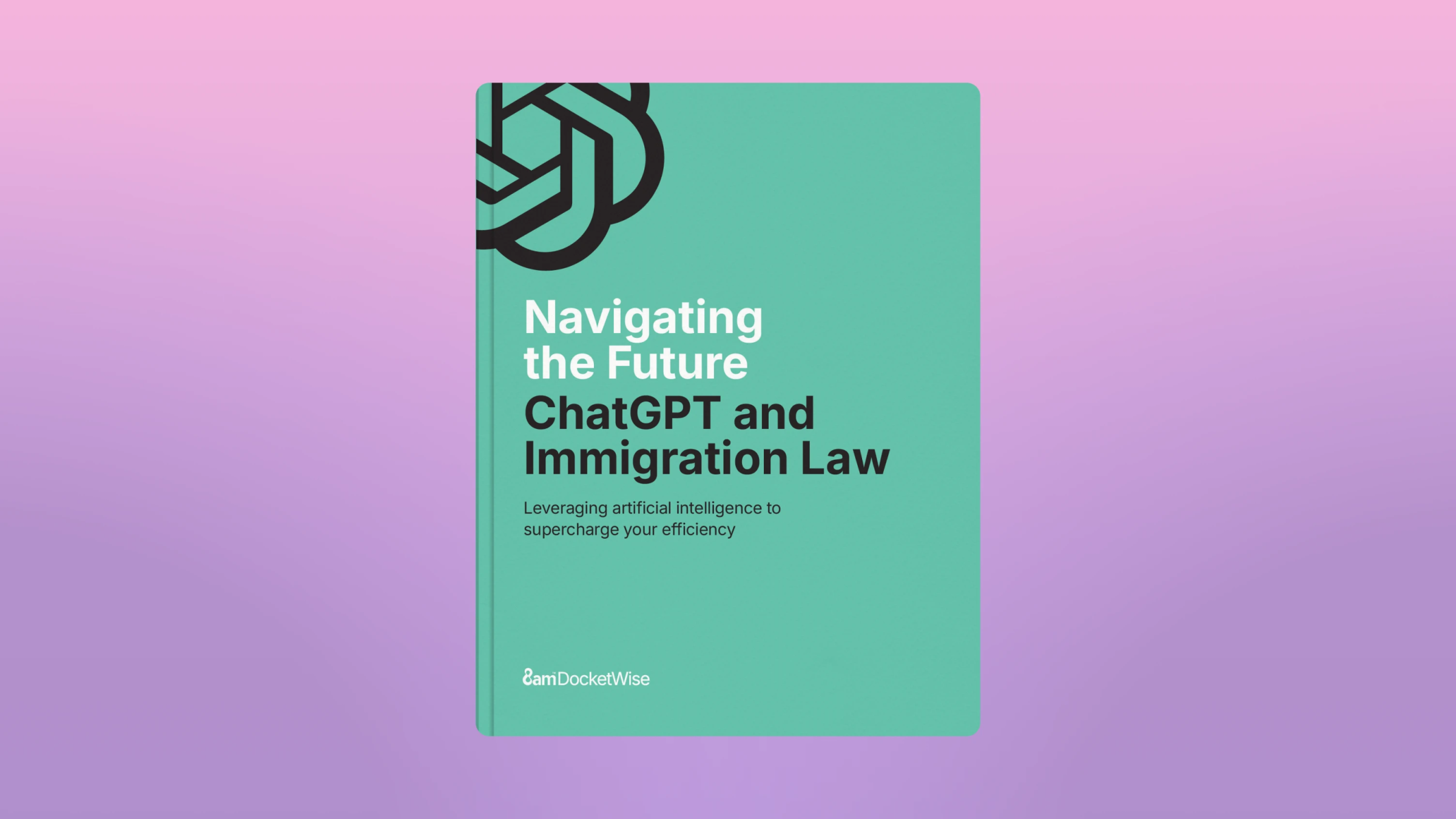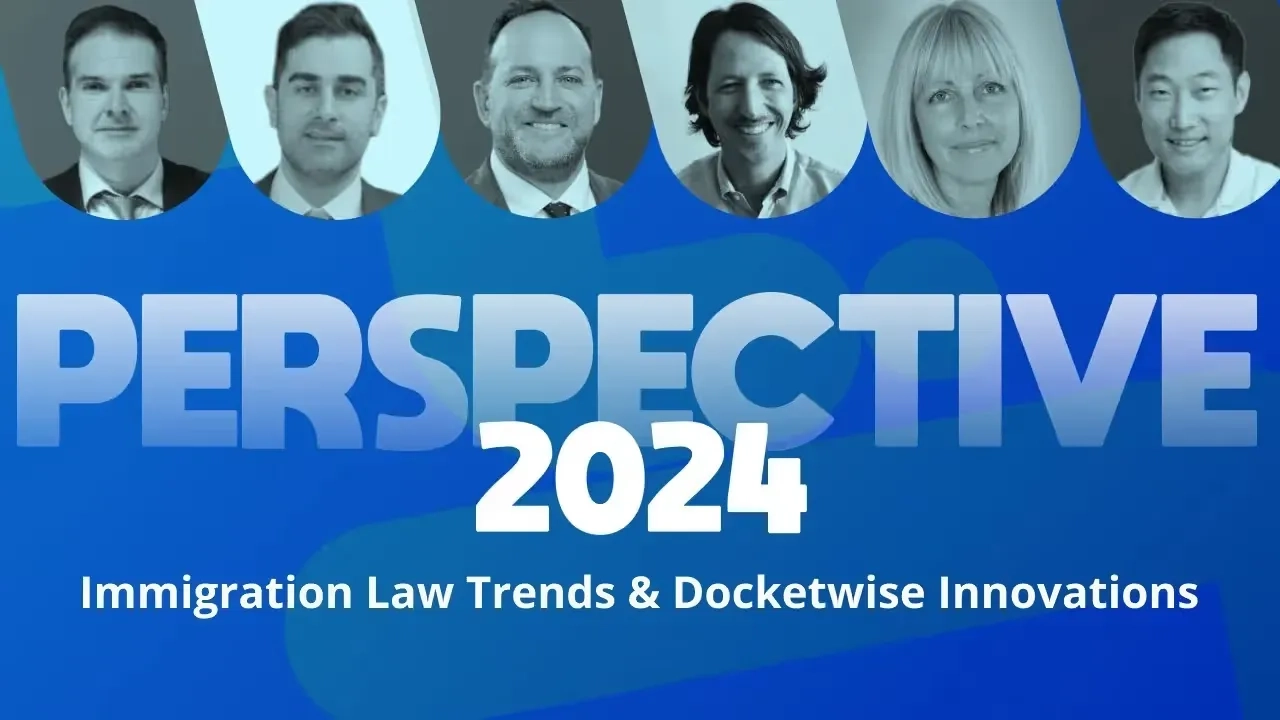Below is a recap of our discussion.
Immigration Law Trends and Innovations: A Perspective for Immigration Lawyers
Welcome to the blog post covering the highlights of the Perspective 2024 Immigration Law Trends program, hosted by James Pittman. In this event, numerous immigration experts, including John Kosravi, Nadine Heights, Joshua Goldstein, and Jared Jascott, gather to discuss the innovations in immigration law, practice management, technology, and policy highlights from 2023. Additionally, the panelists delve into potential changes in the immigration landscape in 2024 and explore the evolving role of AI in immigration law. The event also includes a showcase of Docketwise's progress in 2023 and what to expect from their roadmap in 2024.
The Changing Landscape of Immigration Practice
With the rapid advancement of AI-driven technology tools, the immigration law field has witnessed exciting and innovative changes. Online systems for collecting documents and questionnaire data have emerged as valuable resources, especially during the COVID-19 pandemic. These tools have helped streamline processes and improve client experiences, allowing lawyers to provide more efficient access to source material and aid in legal work.
One notable breakthrough in AI is its ability to pass the bar exam, demonstrating its potential to perform legal work with efficiency and accuracy. Tools like Chat GPT and do-it-yourself options are also becoming popular alternatives for seeking legal advice from immigration lawyers. The integration of AI technology into legal practice has the potential to expedite and streamline legal work, making it more affordable for a larger population.
However, while AI tools may handle certain cases, there will always be a need for immigration lawyers, particularly for complex or litigation cases. Lawyers should adapt to this changing landscape and consider how their role is shifting with the increased use of AI. By incorporating AI technology into their practice, lawyers can provide a concierge personal service to guide clients through the immigration process and help them navigate potential pitfalls and errors that may arise with the use of AI tools or self-filing immigration forms.
Navigating Policy and Political Changes
The panelists discussed the potential changes in immigration law and policy for 2024. Asylum policies are likely to undergo significant changes, with potential improvements to the system, although the implications may not be fully understood by the general public. Processing delays and backlogs remain pressing concerns, and some individuals have resorted to filing lawsuits against government agencies to address these delays. Addressing access to justice in these lawsuits is crucial, as high filing fees create barriers for many people.
Executive orders are expected to play a vital role in shaping immigration policy in 2024. The government may prioritize executive orders to address border issues and gain support from Latino voters. Potential executive orders could include expanding Temporary Protected Status (TPS) and family parole processes for countries facing instability. Transparency in the humanitarian parole process to ensure fairness is also being sought after.
The political landscape surrounding immigration policy is unpredictable and constantly changing, making it a challenging area to navigate. There have been significant court decisions, such as the "Pereira" case, which could lead to the reopening of hundreds of thousands of in absentia orders. The potential impact on the already staggering backlog of 2 million cases remains to be seen.
Embracing Technology and Adapting Strategies
Embracing technology is crucial in improving efficiency and productivity in immigration practice. Immigration practitioners can leverage AI augmentation and technology to provide more affordable legal services to a larger population. However, practitioners must also understand the limitations and ensure they strike a balance between utilizing AI tools and providing a human touch.
While some clients may prefer a more automated process, others still value personal interaction and guidance from lawyers. Striking a balance by offering the human touch as an optional service can cater to different client preferences. It is essential for lawyers to find and convey their unique value in the immigration process, emphasizing their role in assisting clients in reuniting with loved ones and pursuing passions and talents in the United States.
To stay informed about emerging trends, immigration practitioners can subscribe to newsletters and updates from organizations like the American Immigration Lawyers Association (AILA) and the American Library Association (ALA). Additionally, AI tools, such as AILA and Gen's joint effort, can help practitioners keep track of emerging trends and laws in immigration.
Conclusion: Navigating the Path Forward
In conclusion, immigration lawyers face a changing landscape in 2024. The integration of AI tools and technology presents both opportunities and challenges. While AI has the potential to expedite legal work and reduce costs, the human touch remains crucial in providing personalized guidance and avoiding potential pitfalls. Lawyers must adapt to the evolving landscape, finding ways to incorporate AI technology into their practice while highlighting their unique value in the immigration process. By leveraging technology, staying informed, and embracing innovation, immigration lawyers can navigate the path forward and provide efficient and effective services to their clients.
As we move into the new year, let us embrace the progress and innovation that will shape the future of immigration law. Stay informed, adapt, and continue providing the highest level of service to your clients as we navigate the changing landscape together. Wishing you all a successful and fulfilling year ahead!
Transform Your Practice with ChatGPT
Discover how AI, particularly ChatGPT, can revolutionize your practice, from automating tasks to mastering effective prompting.
Download Now
About the author
Michael Miello is a digital marketing strategist, designer, and educator specializing in high-converting websites and SEO. As a content writer for Docketwise, he covers emerging legal technology, financial wellness for law firms, the latest industry trends, and the latest industry trends.

